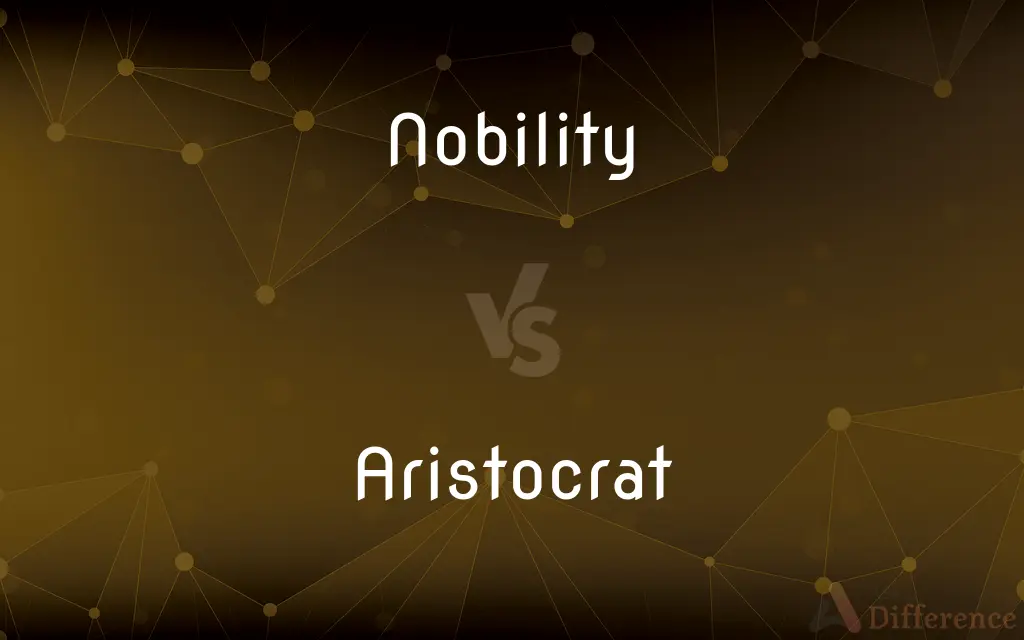Nobility vs. Aristocrat — What's the Difference?
By Fiza Rafique & Urooj Arif — Updated on April 20, 2024
Nobility encompasses a class of high-ranking social elites, often hereditary; aristocrats are specific members of this class, typically holding titles.

Difference Between Nobility and Aristocrat
Table of Contents
ADVERTISEMENT
Key Differences
Nobility refers to a broad social class distinguished by hereditary rank or title, often granted by a monarch. Aristocrats are individuals within this class, known for holding specific noble titles such as duke, baron, or count.
Nobility as a class encompasses various ranks and privileges across different societies, whereas aristocrats represent the titled members of this class, directly involved in governance or ceremonial roles in some countries.
Nobility often implies a sense of social responsibility and duty, historically tied to land ownership and governance. In contrast, aristocrats, especially in contemporary contexts, may be more focused on maintaining status and participating in elite social functions.
The term "nobility" can be used to describe the entire noble class inclusively, while "aristocrat" often points to an individual of notable rank within this class.
While nobility as a concept has evolved over centuries, adapting to changing political and social landscapes, the role and perception of aristocrats have also shifted, reflecting changes in power dynamics and social mobility.
ADVERTISEMENT
Comparison Chart
Definition
A class of people with hereditary ranks
Individuals with specific noble titles
Social Role
Broadly covers various ranks and duties
Often tied to specific roles like governance
Contemporary Relevance
Evolving, adapting to modern roles
More focused on maintaining traditional status
Symbolism
Represents historical continuity and duty
Symbolizes elite status and privilege
Geographical Variance
Varies widely across different cultures
More uniform in role and recognition within cultures
Compare with Definitions
Nobility
A social class known for hereditary privileges.
The nobility in medieval Europe held vast lands and political power.
Aristocrat
Traditionally owns land and wields significant influence.
The aristocrat used his influence to sway political decisions.
Nobility
Historically responsible for governance and military leadership.
The nobility was crucial in shaping the laws of the land.
Aristocrat
Represents a pinnacle of social status and luxury.
The aristocrat traveled in a luxurious carriage drawn by the finest horses.
Nobility
Often patrons of arts and education.
The nobility sponsored many artists during the Renaissance.
Aristocrat
A member of the highest social class in certain societies.
The aristocrat attended the royal court regularly.
Nobility
The collective term for individuals with titles such as "Lord" or "Lady".
The nobility often has a significant role in ceremonial duties.
Aristocrat
Holds specific noble titles such as Duke, Marquess, or Earl.
The aristocrat inherited the title of Earl from his father.
Nobility
Associated with traditions, ceremonies, and a code of honor.
The nobility adhered strictly to the chivalric code.
Aristocrat
Involved in elite social events and networks.
The aristocrat hosted lavish parties that were the highlight of the social season.
Nobility
Nobility is a social class normally ranked immediately below royalty and found in some societies that have a formal aristocracy. Nobility has often been an estate of the realm that possessed more acknowledged privilege and higher social status than most other classes in society.
Aristocrat
A member of a ruling class or of the nobility.
Nobility
A class of persons distinguished by high birth or rank and in Great Britain including dukes and duchesses, marquises and marchionesses, earls and countesses, viscounts and viscountesses, and barons and baronesses
"The old English nobility of office made way for the Norman nobility of faith and landed wealth" (Winston S. Churchill).
Aristocrat
A person having the tastes, manners, or other characteristics of the aristocracy
A natural aristocrat who insists on the best accommodations.
Nobility
Noble rank or status
Congress may not grant titles of nobility.
Aristocrat
A person who advocates government by an aristocracy.
Nobility
The state or quality of being exalted in character.
Aristocrat
One considered the best of its kind
The aristocrat of cars.
Nobility
A noble or privileged social class, historically accompanied by a hereditary title; aristocracy.
Aristocrat
One of the aristocracy, nobility, or people of rank in a community; one of a ruling class; a noble (originally in Revolutionary France).
Nobility
(uncountable) The quality of being noble.
Aristocrat
A proponent of aristocracy; an advocate of aristocratic government.
Nobility
The quality or state of being noble; superiority of mind or of character; commanding excellence; eminence.
Though she hated Amphialus, yet the nobility of her courage prevailed over it.
They thought it great their sovereign to control,And named their pride nobility of soul.
Aristocrat
One of the aristocracy or people of rank in a community; one of a ruling class; a noble.
Nobility
Those who are noble; the collective body of nobles or titled persons in a state; the aristocratic and patrician class; the peerage; as, the English nobility.
Aristocrat
One who is overbearing in his temper or habits; a proud or haughty person.
A born aristocrat, bred radical.
Nobility
A privileged class holding hereditary titles
Aristocrat
One who favors an aristocracy as a form of government, or believes the aristocracy should govern.
His whole family are accused of being aristocrats.
Nobility
The quality of being exalted in character or ideals or conduct
Aristocrat
A member of the aristocracy
Nobility
The state of being of noble birth
Common Curiosities
Do aristocrats still play a political role today?
In some countries, aristocrats still hold ceremonial or actual political roles, though this is less common than in the past.
How does one become a member of the nobility?
Membership in the nobility is usually hereditary, though it can sometimes be granted by a monarch.
What is the difference between nobility and aristocrats?
Nobility is a broad social class, while aristocrats are specific titled members within this class.
What is the highest rank of nobility?
The highest rank varies by country but often includes kings, queens, dukes, and emperors.
Can an aristocrat be someone without a formal title?
Typically, aristocrats hold formal titles; without a title, one might belong to the nobility but not be an aristocrat.
Are all members of the nobility wealthy?
While historically associated with wealth, not all members of the nobility are necessarily wealthy today.
How do the roles of nobility and aristocrats differ in modern society?
In modern societies, nobility often involves ceremonial roles, whereas aristocrats may focus on social status and heritage preservation.
Is the concept of nobility still relevant?
While its practical influence has waned, the concept of nobility still holds cultural and historical significance in many societies.
How are nobility and aristocracy viewed in democratic societies?
In democratic societies, the influence of nobility and aristocracy is largely symbolic and cultural.
How is nobility passed down through generations?
Nobility is usually hereditary, passed down through family lines, often from parent to child.
What responsibilities did the nobility traditionally have?
Traditionally, the nobility was responsible for governance, military leadership, and land management.
Can nobility titles be bought?
Historically, some titles could be purchased or granted for services; today, this practice is largely discontinued.
Do nobility and aristocrats pay taxes?
Yes, nobility and aristocrats are subject to tax laws, though historically they often had different obligations.
Are there any countries without nobility or aristocrats today?
Many countries, especially republics, do not recognize or have abolished hereditary nobility and aristocracy.
What is the difference between nobility and royalty?
Royalty refers to kings, queens, and their immediate families, while nobility includes ranks below royalty.
Share Your Discovery

Previous Comparison
Lifetime vs. Lifespan
Next Comparison
Distressful vs. DistressingAuthor Spotlight
Written by
Fiza RafiqueFiza Rafique is a skilled content writer at AskDifference.com, where she meticulously refines and enhances written pieces. Drawing from her vast editorial expertise, Fiza ensures clarity, accuracy, and precision in every article. Passionate about language, she continually seeks to elevate the quality of content for readers worldwide.
Co-written by
Urooj ArifUrooj is a skilled content writer at Ask Difference, known for her exceptional ability to simplify complex topics into engaging and informative content. With a passion for research and a flair for clear, concise writing, she consistently delivers articles that resonate with our diverse audience.














































